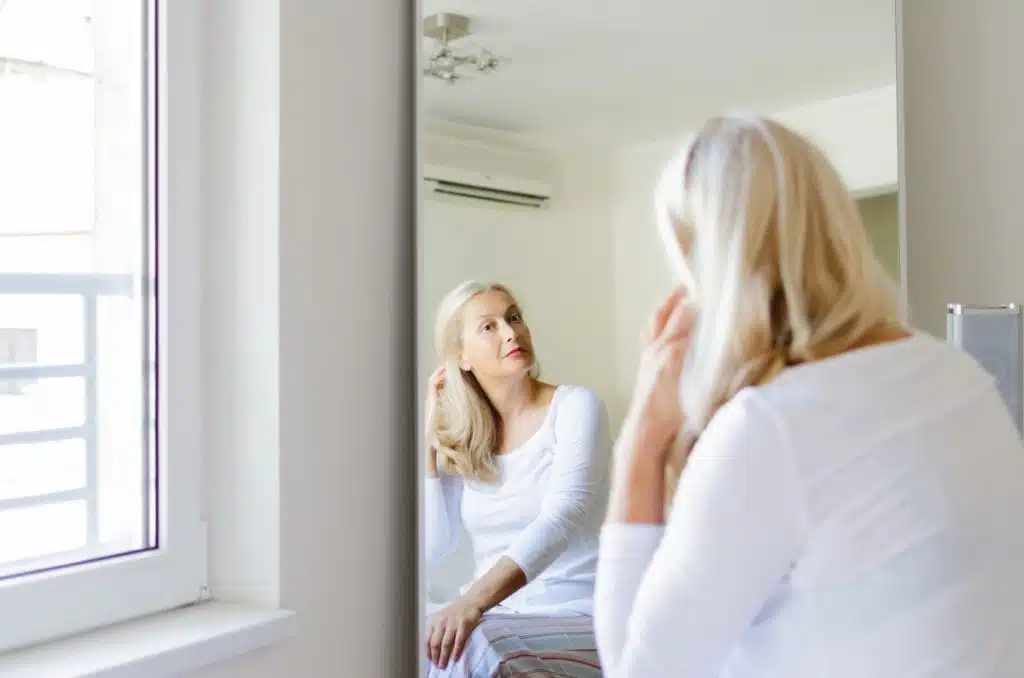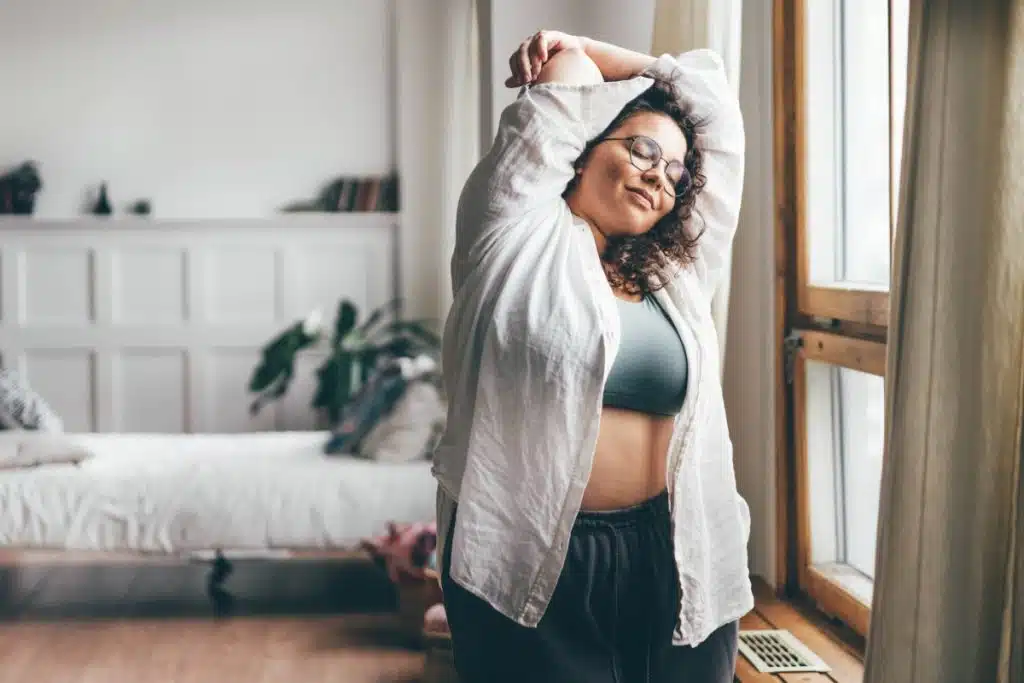
Body checking is so automatic—my bet is you don’t even know you’re doing it. If you take a minute to really think about it, how often do you stop in front of a mirror to scrutinize the width of your hips, the texture of your skin, or the fit of your jeans?
To some degree, we all practice this self-monitoring behavior. So much so that there’s a name for it: body checking. I love the way Katherine Metzelaar MSN, RDN, CD explains what this is:
“I often describe body checking as the fleeting moment between stimulus (‘Omg, how does my stomach look right now!?’), and action (doing the body checking behavior), where there is a hope of relief from the distress or anxious feeling you have. While the body checking behavior is often an attempt to relieve your discomfort or anxiety, it usually leaves you feeling worse off than before you body checked with a heightened sense of anxiety around your body which can be a difficult cycle to get stuck in.”
This cycle is exhausting! Maybe you know what I mean as you think back to how often you check yourself in the mirror or scrutinize your body in a photo. How tiring it is to always be looking for approval that you look “good enough”?
I’m a recovering body-checker and I know how hard it can be to break this habit. If you’re ready to let go of body checking and release all the anxiety that comes with it, you’re in the right place. Let’s dive in and give you some tools to get started.
Note: I want to acknowledge that body checking compulsions can be indicators of a more severe issue, like an eating disorder. To access help and start the healing journey, please visit this resource page from the National Eating Disorders Association.

Body Checking and When It Becomes Unhealthy
Body checking is the frequent evaluation of your external appearance and this can take many forms. For example, some women fixate on their body shape, weight, size, or composition. Others are more concerned with facial features such as teeth, skin, hair, or noses. Here are some examples:
- When you check your hair every time you catch your reflection in a mirror.
- When you question the size of your legs as you look down at your thighs while sitting.
- When you dissect your outfit or the size of your arms as you look at a photo someone took of you.
Body checking can manifest at an early age and in many forms. I recall feeling insecure as an 8-year-old because of a comment someone made about my thighs. No matter how you look, what size you are, or your current stage of life, anyone can be prone to body checking.
As “normal” as this is, it isn’t always healthy. Body checking exists on a continuum. You might fall into the habit occasionally with no serious repercussions, or it could escalate into an unrelenting obsession.
How can you determine where you are on this spectrum? Here’s a helpful barometer from Liz Cook, MS, RD, LDN: “When body checking becomes something that interferes with your normal daily routine or starts to take up a lot of your time, it’s no longer a neutral behavior.”
Signs That Body Checking Has Become Harmful
When body checking tendencies result in dissatisfaction with yourself, that’s when it becomes a problem. These behaviors are rooted in shame, negative self-talk, and a poor sense of worth. At the end of the day, we live in a society that glorifies a very specific body type—and body checking is our way to see if we’re measuring up or not.
It’s important to know that body checking doesn’t only happen among women with eating disorders. Body checking, and the ramifications of it, can and do impact anyone. And It’s no wonder this sad truth is our reality—in a recent survey, more than 4,250 women shared their views on body image and here are some of the results:
- 88% feel their body weight or shape is at least moderately important.
- 74% have a list of foods they either will or won’t allow themselves to eat.
- 69% believe that larger bodies are not as healthy as smaller bodies.
- 32% think being thin is an indication of fitness and personal discipline.
- 14% would take 1–5 years off their lives in exchange for the “ideal” body.
Body checking is an attempt to calm all the anxiety around enoughness—good enough, thin enough, pretty enough.
My Body Checking Journey
I have been hard on myself since I was a little girl, striving for an ideal body shape for my whole life. As a dancer, body checking quickly became a regular part of my life. The pressure of being measured for costumes, judged for performance, and spending hours looking in the mirror alongside my peers led to an unhealthy level of body checking.
Once I entered the fitness space as a Pilates instructor I quickly realized I could be a part of the ongoing pressure that women face to look a certain way, or I could be a part of the solution. It became very evident that leaning in the traditional wellness gimmicks generated more clients and profits for my business and the companies I worked for.
However, considering my own experience with body insecurities, I didn’t feel good about this. I recognized that I had a choice: either leave the industry or make a change in whatever areas I could. More than a decade later and my career as a Pilates instructor has now transformed into so much more than just helping others achieve their physical health and fitness goals.
As the founder of Lindywell, my mission is now to help others break free from the layers of dissatisfaction and societal pressures we deal with on a continual basis and feel good in their body and mind. This is why at Lindywell, we say over and over again: grace over guilt!
I would say I am a recovering body-checker now. Thanks to the work I’ve done around this, I live with more freedom than ever before, and I want this outcome for you too.
Become a Recovering Body Checker With Me
Healing from body checking doesn’t happen overnight. It takes mindful action and consistent effort to recognize the habit, challenge the thoughts, and start to release what you’ve become accustomed to doing. Here are a few steps you can take to make this happen for yourself.
- Step 1: Become aware of when you’re body-checking. This awareness can help you start to recognize when you do it in the moment. It happens so quickly and automatically, you might not know right away. Be mindful throughout your day and try to notice when you do it.
- Step 2: In the moment, ask yourself: “Why do I want to check my body right now?” This can be helpful to understand what you get out of it. We, as humans, do everything for a reason. Are you looking for validation that your stomach is flat? Do you want to be reminded that your arms are thin enough? What’s the benefit of doing this?
- Step 3: Choose a reframe, or mantra, to counteract that feeling of “not enough” in the moment. Here are a few of mine: “Wellness does not equal weight loss.” “Health and fitness habits don’t have to be all or nothing.” The goal is to choose a phrase that helps you challenge the negative thought that’s pushing you to body check in the first place. Check out our blog post on self-love mantras if you’re feeling stuck on this part.
- Step 4: Catch yourself before you body check. If you’re being mindful throughout your day, and you notice you want to body check—start with your reframe and then stop yourself from doing it. This will be hard because your mind is craving that validation, so use your reframe or mantra as your anchor. With practice and time, it becomes easier, I promise!
- Step 5: Check out my book, Well to the Core, where I talk all about what true health and wellness look like—beyond the mirror or the shape of your body. Along the way I provide tons of actionable steps you can take to feel well to your core.
You Deserve a Life Free from Body Checking
We no longer need to live under the constant pressure of negative self-talk and compulsive body checking. You can let go of this automatic (and toxic) habit if you get intentional and take consistent action to reframe and catch yourself in the moment. I know how challenging this can be, so please remember to keep trying—it does get easier!
Start this journey to freedom right now and start your free trial of Lindywell. As a member, you have access to gentle Pilates workouts, nourishing recipes, and guided breathwork sessions—all curated to help you discover true health.










3 thoughts on “Body Checking: The Dangerous Habit You Don’t Even Know You Have”
I just stumbled upon Lindywell’s “Body Checking” page, and I must say, I am thoroughly impressed! The way they approach the topic with such care, empathy, and expertise truly shines through. The information provided is not only comprehensive but also incredibly insightful. It’s evident that Lindywell prioritizes mental and physical well-being, offering resources that can genuinely make a positive difference in people’s lives. Kudos to Lindywell for creating such a valuable resource that promotes self-awareness and body positivity!
Good article! I’m a body checker ! I’m 65 and did this my whole life but not in a dangerous way! It helps that I’m on the smaller size for my age . After reading this article, I will be conscience of this.
when I do your Pilates 3 times I feel better about body image .
We’re so glad that you are a part of the Lindywell community and noticing the difference that consistent, effective Pilates can do for how you feel! We are cheering you on, Margie!